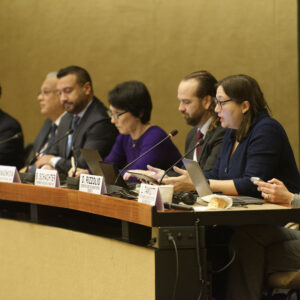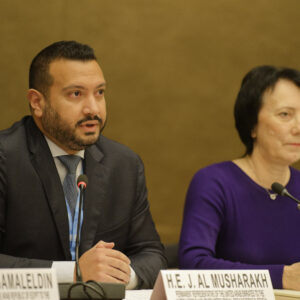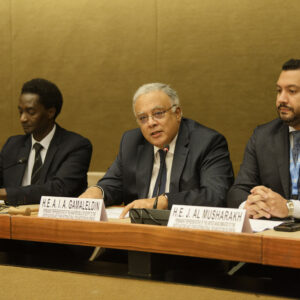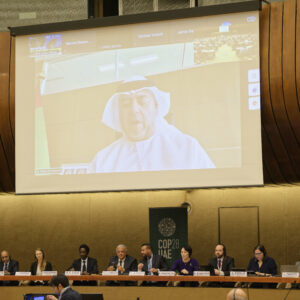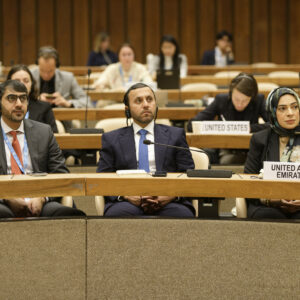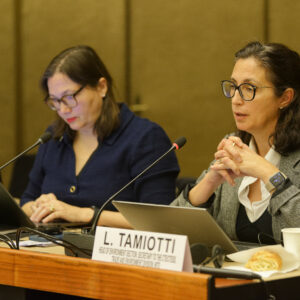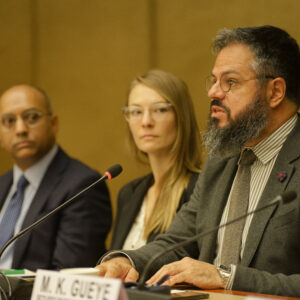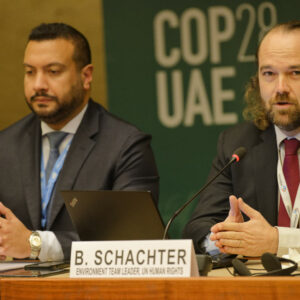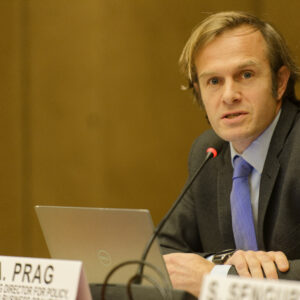Event Conference
Briefing on the UN Climate Change Conference (COP28)

21 Nov 2023
10:00–12:00
Venue: Palais des Nations | Room XVIII & Online
Organization: United Arab Emirates, Geneva Environment Network
This briefing on the UN Climate Change Conference, to take place from 30 November until 12 December 2023, under the presidency of the United Arab Emirates, is organized by the Permanent Mission of the United Arab Emirates to the United Nations Office and other international organizations in Geneva and the Geneva Environment Network.

About the Event
The 28th meeting of the Conference of the Parties to the United Nations Framework Convention on Climate Change (COP28), scheduled from 30 November to 12 December 2023, under the presidency of the United Arab Emirates, will mark a major milestone as the world will take stock of its progress on the Paris Agreement.
The first Global Stocktake (GST) will provide a comprehensive assessment of progress since adopting the Paris Agreement. This will help align the efforts on climate action, including measures that need to be put in place to bridge the gaps in progress.
As we approach COP28, the Permanent Mission of the United Arab Emirates to the United Nations Office and other International Organizations in Geneva and the Geneva Environment Network hosted a briefing, on the challenges of and opportunities in addressing climate change, and the contributions of international Geneva to this global agenda.

Speakers
By order of intervention.

H.E. Amb. Jamal AL MUSHARAKH
Permanent Representative of the United Arab Emirates to the United Nations Office and other international organizations in Geneva

H.E. Amb. Ahmed Ihab Abdelahad GAMALELDIN
Permanent Representative the Arab Republic of Egypt to the United Nations Office and other international organizations in Geneva

H.E. Amb. Majid AL SUWAIDI
Director-General and Special Representative, COP28

Daniele VIOLETTI
Senior Director, Programmes Coordination, UNFCCC Secretariat

Jamie DEAN
Head of Operations and Guest Services, COP28 Presidency

Elena MANAENKOVA
Deputy Secretary-General, WMO

Moustapha Kamal GUEYE
Director, Priority Action Programme on Just Transitions Towards Environmentally Sustainable Economies and Societies, ILO

Marina MAIERO
Partnerships & Advocacy, Climate Change and Health Team, WHO

Ludivine TAMIOTTI
Head of Environment Section, Secretary to the CTE/CTESS, Trade and Environment Division, WTO

Manuel MARQUES PEREIRA
Director OiC, Peace & Development Coordination, IOM
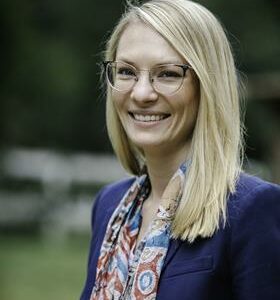
Jesica ANDREWS
Head of Climate Accountability, UNEP Finance Initiative

Benjamin SCHACHTER
Environment team leader, UN Human Rights

Sandeep SENGUPTA
Global Policy Lead, Climate Change, International Policy Centre, IUCN

Andrew PRAG
Managing Director for Policy, We Mean Business Coalition

Francesca MINGRONE
Staff Attorney, Climate & Energy Program, CIEL | Geneva Climate Change Consultation Group (GeCCco)

Diana RIZZOLIO
Coordinator, Geneva Environment Network | Moderator
Summary
Diana Rizzolio | Coordinator, Geneva Environment Network | Moderator
- There is no doubt that international Geneva is mobilized in the fight against the triple interconnected planetary crisis of climate change, biodiversity loss and pollution that the earth is facing, and that is threatening the well-being and survival of millions of people around the world.
- When it comes to climate action in international Geneva, the secretariat of the Intergovernmental Panel on Climate Change (or IPCC) and the World Meteorological Organization, bringing to us the scientific evidence of climate change and other important data and knowledge to mitigate and adapt to its impacts, are probably the two institutions most quoted on this matter.
- However, it is now well recognized that in addition to these two important bodies, the numerous international organizations, permanent missions, non-governmental organizations and other institutions based in Geneva place the climate issue at the heart of their work.
- As the world capital for multilateralism, Geneva is at the center of numerous debates and negotiations in the fields of science, health, human rights, development, trade and green finance, employment, peacebuilding and security, disaster risk reduction, humanitarian response, nature conservation, chemicals and pollution, as well as new technologies and innovation.
- This interdisciplinarity allows International Geneva to have unique cross-disciplinary expertise on climate, this theme being on the agenda of numerous deliberations. And we have invited some key Geneva stakeholders to join us today to share what they plan to bring to Dubai to accelerate climate action. However if we had to have on stage the numerous actors of international Geneva that are contributing to a more ambitious climate action, there wouldn’t be a room with a podium large enough to fit them. We have however todays ensured representativeness on thematics that will have their specific day at COP28.
- Geneva is not only contributing in terms of substance to the climate negotiations, but also with logistics. Indeed, as we are here at the headquarters of the United Nations Office in Geneva, UNOG, I would also like to refer to our conference services colleagues, as well as the security guards that welcomed you this morning, who regularly make our convenings possible and who regulary join our colleagues from the UN Climate Change Secretariat, to support their meetings around the world.
- As the Secretary-General of the United Nations regularly mentions, COP28 must be the place to urgently close the climate ambition gap, as emissions continue to rise, as it has been illustrated in the various reports and statements that the UN System and other actors have been issuing in the past months and weeks, including in the latest UNEP emissions gap report issued on 20 November 2023.
- The latest IPCC assessment has concluded that there are multiple, feasible and effective options to reduce greenhouse gas emissions and adapt to human-caused climate change, and they are available now.
Opening Remarks
H.E. Amb. Jamal AL MUSHARAKH | Permanent Representative of the United Arab Emirates to the United Nations Office and other international organizations in Geneva
- As host to the 28th Conference of the Parties to the UN Climate Change Conference (COP28), the United Arab Emirates wishes to positively impact the lives of everyone around the world.
- Recognizing the achievements of COP27 under the Egyptian presidency, in particular, the establishment of a loss and damage fund – the first fund dedicated to addressing climate-driven damage – participants to this briefing demonstrate the commitment to having as many voices around the table and being as inclusive as possible.
- The concept of consensus remains the prerequisite for the discussions at COP28. Our shared goal as an International Community is to achieve tangible outcomes through multilateralism.
- We have come a long way since the Paris Agreement, but it is only unity and foresight that will drive us forward, leaving no one behind.
- Finance must aim to synergize the Global South’s climate action and development ambitions. This will require shared inputs to renew the mindset of financial institutions.
- Trust must be a guiding spirit and approach guiding us in COP28, along with the inclusivity of voices of women, youth, indigenous people, businesses, governments, civil society, academia, technology, industry and the health sector. All voices are welcome and significant.
- We look forward to a COP28 based on results and not only words, where discussions are driven by consensus and trust.
H.E. Amb. Ahmed Ihab Abdelahad GAMALELDIN | Permanent Representative the Arab Republic of Egypt to the United Nations Office and other international organizations in Geneva
- Climate change is a global challenge that require requires International cooperation and multilateral solutions.
- COP28 is a critical moment for the world as we must collectively agree on decisive action to continue our inclusive, just and effective tackling of climate change guided by science and anchored in our agreed principles.
- During our presidency of COP27, Egypt was committed to reinstate climate justice and advance implementation while promoting the principles of equity, sustainable development, effective actions, and no backsliding.
- Many achievements were made in all climate tracks in COP27, including loss and damage, mitigation, adaptation, finance and just transition.
- We are relying on COP28 with its bold vision to build on these outcomes and to deliver on several pressing issues awaiting resolution.
- We are not on track to meet the goals of the Paris Agreement. We need to do more to reduce emissions, support adaptation and build resilience to climate change.
- We must galvanize the political will to fulfill pledges and commitments and to provide the necessary means of implementation for developing countries, including technology and appropriate financial resources to address the existential threat of climate change and enable developing countries to implement their nationally determined contributions and increase their ambition.
High Ambition for COP28
H.E. Amb. Majid AL SUWAIDI | Director-General and Special Representative, COP28
- With just mere days away from the inauguration of COP28, we are in the homestretch.
- In this year of preparation, our Office has carried out impressive efforts. The year leading up to COP has been extremely challenging, particularly for those communities on the frontlines of the climate crisis. Communities and ecosystems around the world have been hard hit by extreme, unpredictable weather. We have seen record-high temperatures on land and sea, dramatic droughts and floods. The planet has been sending us warnings that the window to achieve our climate goals is narrowing.
- At COP28, we have an opportunity to strengthen global solidarity, agree on the way forward to correct the course of global climate action, and inspire change and hope.
- The Paris Agreement has helped bring us from a 4+ degree Celsius trajectory to a 2.4-degree one. It has also helped bring clarity that:
• we should strive to keep global average temperature rise to 1.5C.
• we must treat adaptation and mitigation with equal priority and importance.
• that all countries must continue to endeavour to move farther and faster on climate, together. - Despite all of this, we are still facing large gaps across all the pillars of the Paris Agreement. At COP28, we will come to a moment of truth when we, as a global community, respond to the first inaugural Global Stocktake.
- We will signal to the world how we intend to address the gaps that we need to bridge in the face of ever-increasing and ever-worsening climate impacts. Done correctly, it can set the highest bar for ambition, while recognizing the different starting points of every party and ensure equity for all.
- This is the message that we have shared with the world throughout this year. We have heavily engaged with political leaders, academics, the civil society, and the real economy to set COP28 for success.
- In just over a week, Parties, and non-Party stakeholders across all sectors of society and the economy will come together to show how they are moving from words to action. We want COP28 to help facilitate the transformation of our economies, protect lives and livelihoods, safeguard our shared future, and keep the goals of the Paris Agreement within reach. For that to happen, we have based our strategy on a four-point Action Plan. This includes:
- Fast-tracking a just and orderly energy transition.
We need to rapidly build the energy system of tomorrow, free of unabated fossil fuels while decarbonizing the
energies we use today. It is not a question of if we need an energy transition, but how fast and how can we do it in an equitable, managed and just manner that leaves no one behind. It will require hard discussions; it will take vision and it will take unprecedented levels of international collaboration and cooperation. But together, we can find a common way forward. To build the energy systems of tomorrow, the COP28 Presidency has called for global pledges to triple renewable energy generation capacity to 11,000 gigawatts and double the annual average global rate of energy efficiency improvements by 2030. This has been endorsed by the EU, African Union, Kenya and the G20 – accounting for 85% of the global economy – on the renewables tripling. But this must also come with urgent action to decarbonize the energies we use today – from driving down emissions from heavy emitting sectors, accelerating efforts towards the phasedown of unabated coal power, aligning the oil and gas industry around ambitious but achievable decarbonization and methane targets. - Fixing climate finance and delivering on previous promises.
We are working to reform the architecture of the global financial system to make it fit-for-purpose and reflect the realities of today, to ensure that both public and private capital deliver at pace and scale to enable on the achievement of our collective climate ambitions. To ensure that finance is accessible, affordable and is flowing to where it is needed most. At the same time, we are calling for the reform of multilateral development banks (MDBs) and international financial institutions (IFIs), so that they can work better together as a system, scale up adaptation finance, better leverage private finance, take on more risk and re-channel special drawing rights (SDRs) for climate action. We welcome the recent OECD report that the $100B was likely met last year, but we continue to urge contributing countries to deliver on the $100 billion commitment this year, to concretely show how they will deliver the doubling of adaptation finance over 2019 levels by 2025 and seek to further enhance adaptation support; and ensure an ambitious second replenishment of the Green Climate Fund. We need early pledges on Loss and Damage. - Placing nature, people, lives, and livelihoods at the heart of climate action.
It is imperative that, at COP28, we make huge strides to facilitate the implementation of a Global Goal on Adaptation, a framework that enables us to move beyond the business-as-usual approach to adaptation which has clearly failed us given the large gap we face in adaptation. We are supporting this objective by launching and asking Parties for the endorsement of several political declarations. Our Presidency has created the Emirates Declaration on Sustainable Agriculture, Resilient Food Systems and Climate Action, which cements leader-level commitments to transform agri-food systems. Raising the political visibility of health and climate, we developed the COP28 Declaration on Climate and Health to build consensuson the health system’s response to climate change and secure financing commitments for implementation. We are also promoting a Global Cooling Pledge to reduce global cooling-related emissions by countries committing to improving the efficiency of appliances and broadening access to efficient cooling. - Underpinning all action with full inclusivity.
Inclusion has been the cornerstone of the COP28 Presidency. We are striving to have the voices and contributions from every country, every community, every sector, and every citizen. To that end, we have created a Gender-Responsive Just Transition and Climate Action Partnership, which builds consensus around policy and finance to improve gender equality and decent work through the just transition. We cannot ignore that half of least-developed countries are affected by conflict or fragility. And they rely on a small number of increasingly overwhelmed humanitarian actors. The costs of inaction are high, risking further destabilization, displacement, loss and damage and reversal of development gains. To address this, we have created the Climate Relief, Recovery, and Peace Declaration, for countries and partners to make a collective commitment to increase action, investment and absorption capacity in communities affected by conflict or protracted humanitarian crisis. The declaration will be accompanied by a package of finance, policy, programs, and practices for operationalization.
Just last month, we hosted 70 ministers and 100 delegations from around the world for what was the largest pre-COP to date. Some notable highlights include:
- Meaningful progress was made on the development of the outline for the Global Stocktake decision at COP28.
- On difficult subjects, negotiators made good progress on building consensus and momentum to find landing zones.
- Key stakeholders and parties came together to advance discussions on non-negotiated outcomes from energy and finance to nature, food, youth, and health.
We reached a significant breakthrough in reaching a robust set of recommendations for operationalizing the Loss and Damage Fund and funding arrangements, at the Fifth Transitional Committee meeting in Abu Dhabi.
These recommendations pave the way for agreement at COP28 and marks a crucial step forward in responding to the needs of the most vulnerable. Although much of the work still lies ahead of us, the momentum coming out of pre-COP and the TC5 meeting is a positive signal for what’s to come at COP28. It is also an important reminder that multilateralism can and must deliver.
We are very clear that this is a good outcome, and everyone should stand behind it. We need all parties now to agree on these recommendations at COP28. The global community demands real action, and we must rise to meet their expectations. We must restore trust in multilateralism. I ask that we all come prepared for COP28. Prepared to contribute, collaborate, and deliver. COP28 must be the moment when our ambitions become actions and promises become progress.
Daniele VIOLETTI | Senior Director, Programmes Coordination, UNFCCC Secretariat
- The first Global Stocktake is the key outcome of COP28 and it will likely show that we are far from the trajectory we need to be on to achieve the goals of the Paris Agreement.We expect the GST will become a course correction moment, sending the political signals on the need to announce action by governments, and non-party stakeholders across all areas: mitigation, adaptation, loss and damage, means of implementation in particular finance.
- The recently completed process, the technical dialogue under the GST, resulted in a final report, which confirms that we are still far from a path leading to limiting global warming to 1.5 or even 2 degrees. The technical assessment has also shown a few positive findings.
- The Paris Agreement has already intensified climate action and related support leading to a reduction in the forecast of global warming numbers.
- As consistent with earlier findings by the Intergovernmental Panel on Climate Change (IPCC), sufficient cost-effective opportunities to address the 2030 emission gap – even if with significant challenges – exist. One of the biggest challenges is access and availability of support, so these opportunities need to be harnessed at the required pace and scale.
- International cooperation can help share experiences; realize opportunities; overcome barriers and challenges in the implementation of adaptation plans and promote learning from group practice across various countries and sectors.
- The political phase of the GST will culminate at COP28. At Pre-COP28, intense political discussion demonstrated that parties are committed to achieving ambitious outcomes from the GTS while significant divergencies withstand.
- COP28 is not only the global stock take. Many other crucial and ambitious outcomes are expected for furthering the complex multifaceted process of climate action.COP28 should address a large variety of issues to move implementation forward. Loss and damage; just transition; adaptation; mitigation; and finance are at the center of the expected outcomes.
- Loss and damage: building on the landmark COP27 decision in Sharm-el-Sheik establishing a fund to address loss and damage must move to the implementation phase. In addition, the operationalization of the Santiago Network for loss and damage is another critical milestone to deliver.This will support efforts to make the international climate change regime fully fit for the purpose for addressing loss and damage. We are pleased with the recommendations of the Transitional Committee at the Fifth Meeting in Abu Dhabi putting a positive narrative on COP28.
- Global goal on adaptation. Major outcomes are expected for it to complete the three pillars of the Paris Agreement. We are confident that COP28 will deliver on that, strengthening adaptation efforts at local, national and regional levels and underpin the planning and implementation of adaptation actions.
- Mitigation programs will need to be assessed at COP28 with the view of making it more efficient and more impactful in the light of the urgence to address emissions gap. The recently published UNFCCC Flagship NDCs synthesis report identified positive trends despite mitigation action will continue to play a central role in meeting the mid-century goal. The outcome the GTS will inform the next round of NDCs to be submitted in 2025.
- Finance is a cross-cutting and central topic to COP negotiations. Expectations include a robust replenishment of the green climate fund. A new collective quantified goal on climate finance is expected to COP29 but progress in that discussion will confirm we are on track for delivering. We also expect discussion on how to make financial flows consistent with the objectives of the Paris Agreement. The International Financial system response to the call for reform will also be discussed.
- Just Transition. Being another important deliverable established formally at COP27, it requires to be defined substantively in terms of its content, scope, modalities, and timelines. Everybody is keen to move to the next phase of the process of making sure that nobody is left behind in this process.
- The first biennal transparency reports are due in 2024 at COP29 and is a very important pillar of the overall Paris Agreement discussions are expected to commence already.
- Besides these negotiating items, initiatives and declarations are expected to complement the formal outcome.
- Scaling up of action by non-party stakeholders in the framework of the action agenda to demonstrate the immediate response to real-world including policy, finance, and technology solutions. The World Climate Action Summit will take place at the very beginning to set the political tone for the ambition at COP28.
- We are confident that the outcomes of COP28 will make an important contribution to strengthening climate action further and put us on the right path to the goals of the Paris Agreement.
Update on Preparations
Jamie DEAN | Head of Operations and Guest Services, COP28 Presidency


 Further information on logistics can be found on the UNFCCC webpage.
Further information on logistics can be found on the UNFCCC webpage.
International Geneva at COP28
Elena MANAENKOVA | Deputy Secretary-General, WMO
- Climate science should serve every sector and it is increasingly clear that climate change, climate action and climate impact affect everybody.
- The main challenge that guides WMO work on climate change is ensuring good science can continuously help health, energy, water management, agriculture, food security and all sectors.
- WMO’s work on climate change began before UNFCCC and we are proud supporters of every COP. Climate science is robust, trustful and it forms a solid basis for all decisions we take at the COPs and to guide countries’ actions. Science continues to be required by an ever-increasing number of different sectors, WMO continues providing scientific assessments, reports and projections to help with details and nuances thanks to cooperation with the global community.
WMO Reports to be presented at COP28
- WMO will release its State of Climate Report for 2023 (preliminary) at COP28. As recently found in the 2023 Greenhouse Gas Bulletin, concentrations of lead greenhouse gases continue to rise. Therefore, it will come as no surprise that the findings of the provisional State of Climate Report for 2023 will indicate that 2023 is the hottest year on record.
- Most climate indicators will show new record values, and this means that the impacts and effects on people’s lives, nature and ecosystems, and livelihoods will become more significant, frequent, and severe.
- In our reports, we increasingly show the disaster effects on the population and sectors. WMO will also launch at COP28 its decadal climate report for the past decade; its Climate Services Report on Health; and the State of Global Water Resources.
- The Global Water Resources reports are demonstrating huge stress points in most parts of most continents and this just sustains our wish and our need to bring water into the COP processes. WMO will also soon release a new study of UN-Water on water dependency on all mitigation actions, making it necessary to know how much water is needed for both adaptation and mitigation because it might become a significant challenge to share limited water resources amongst many.
- WMO-IRENA’s first report on renewable energy and climate effects on renewable energy and on the sources it needs. Finally, there will be also the Kigali declaration from the climate open science conference we just concluded.
WMO actions at COP28 will include:
- Helping members and countries in their implementation and the COP Presidency to pursue its goals.
- Fostering people and nature-centered climate action because WMO prioritizes saving lives. The recognition by COP27 of The Early Warning For All Initiative of the UN Secretary-General was a great achievement, despite the challenge to reach the global coverage of all people in the world by 2027. At COP28 we will be offering assistance to members to further more practical actions on how best to include early warnings and underlying science and observations into relevant work streams. We need to scale financing and while we are rapidly doing assessments of the countries of their readiness and capabilities in the early warning systems, we would urge countries to use these capabilities in the global stocktake metrics and in the global goal for adaptation, to have a sort of indicator on early warnings.
- At COP27 the Egyptian presidency recognized water as an important factor in adaptation. Mitigation actions depend on water and competition between different sectors and water availability is unavoidable. Careful planning is thus necessary therefore WMO will be offering facts and figures and scientific assessments to start becoming water aware.
- The greenhouse gas watch system. WMO reports on the concentrations of CO2, methane and other greenhouse gases concentration globally, but this is not enough for countries and for sectors to assess realistically the fluxes and natural sinks. To have a net effect of the sectors into the Global Greenhouse Gas concentrations, WMO Congress already endorsed the framework initiative which we will be developing as a support tool for everyone to refine the mitigation actions.
Ludivine TAMIOTTI | Head of Environment Section, Secretary to the CTE/CTESS, Trade and Environment Division, WTO
Climate change and trade have been the center of discussions in the WTO Committee on Trade and Environment. Discussions tackle both the impact of climate measures from members on trade and how trade can contribute to climate mitigation and adaptation.
WTO Secretariat contributions at COP28 will include:
- The first-ever Trade Day at COP28 will feature a series of high-level events on trade aspects with inputs from global leaders, governments, business and civil society to advocate trade as an integral part of the solution to climate change. Events will be looking at how trade policy tools can help in promoting this global response to more specific topics like critical minerals.
- WTO will host for the first time a Trade House Pavilion together with the International Chamber of Commerce (ICC), the International Trade Centre (ITC), and the United Nations Conference on Trade and Development (UNCTAD) hosting over 50 events.
- Knowledge building and concrete actions. WTO will launch several publications including one on trade policy tools for climate action to showcase trade-related policies governments are already using to implement climate goals and to enhance their contribution to climate change mitigation and adaptation. These trade tools are meant as a source of inspiration to show how trade and trade measures can be used to push for more uh positive contributions to climate mitigation. Another publication that will be launched was written with IRENA on international trade and green hydrogen, exploring for the first time the role of hydrogen produced by renewable power in supporting the global transition to low-carbon energy and what trade policies can do to foster the development of green hydrogen markets. Joining over 20 standard-setting bodies, industry associations, companies, international organizations and civil society in launching the steel standards principles. This is done in the context of work that the WTO has been carrying out starting earlier this year in the context of trade for decarbonization standards in the steel sectors. This will be instrumental in contributing to a new near-zero transition and minimizing trade tensions.
This year, WTO will showcase how trade can be part of the solution to climate mitigation and adaptation actions and we hope that this will be an opportunity to outline to the climate community all the concrete elements that can be can be done in this context from a trade perspective.
Marina MAIERO | Partnerships & Advocacy, Climate Change and Health Team, WHO
- The health community is grateful to the COP28 presidency as this year will be the first time in the history of climate change negotiations that health will be given meaningful attention through a dedicated Health Day on 3 December 2023. More than 60 Ministers of Health confirmed their presence in Dubai.
- While various important events will take place during Heath Day, the most important will be the high-level ministerial roundtables concluding the day. In these health ministerial we love to endorse and raise the profile of an important document that WHO together with the UAE Presidency and many champion countries have developed: a declaration on climate and health.
- The COP Declaration on climate and health was developed with champion countries Brazil, Egypt, Fiji, Germany, India, Kenya and Malawi. As of today, 39 countries have endorsed and it is important for all countries to do so.
- WHO will also host a Health Pavilion where more than 40 health-dedicated side events will take place. This will offer the opportunity to promote collaborations with all the other UN agencies and the Health Community, as illustrated by the WHO/WMO State of Climate Service for Health report and many others. Several health high-level events will take place while to an important installation by the solarized Health Care Facility. It will allow us to exhibit what it means to invest in renewable energy for healthcare facilities, the kind of high-level quality services we can provide if a good investment the right investment is made on solarized healthcare facilities. Visitors can experience what it means not to have power or energy in a care facility, which is the case in more than 60% of healthcare facilities around the world, in particular in African settings, and what you can get in terms of services just by installing a solar panel. This is an important message by the health community to showcase the importance of investing in the right energy means. Improving health means addressing the climate issue.
- WHO is motivated to make the health day a meaningful and impactful one on the overall climate negotiation process.
Moustapha Kamal GUEYE | Director, Priority Action Programme on Just Transitions Towards Environmentally Sustainable Economies and Societies, ILO
- COP28 will be the space to close the climate ambition gap. Ambition is not only about numbers. Ambition is really about people, workers who have the right skills to change our energy systems, food, agriculture and transport. Ambition is about enterprises that are capable of innovating, investing in new production methods, and building new business models. Ambition is about communities that can diversify their economies and transform them in particular those that are coal and fossil-fuel dependent.
- This is exactly why the Paris Agreement on climate change placed a just transition of the workforce and the creation of decent jobs as an imperative in tackling climate change and why the IPCC change in its six-assessment report noted that social justice equity and just transition are enablers of mitigation and adaptation.
- COP27 resulted in a very important outcome: start negotiations towards a UNFCCC work program on just transition. COP28 will be the moment to concretize that work program on just transition.
- In June this year, the International Labor Conference discussed the topic of a just transition. The conference reminded us that ambitious action can be a positive narrative. ILO estimates that if countries implement the Paris Agreement in the energy sector alone, we could deliver an additional 24 million jobs by 2030. If a low-carbon economy goes hand in hand with a circular economy, it would be possible to generate 100 million jobs by 2030. Ambitious climate action is not a job killer, it is the opposite. It can deliver more and better jobs. Job gains are not going to be by default they would require coherent policy frameworks that marry the climate ambition with the necessary social and economic dimensions.
- The outcomes of the ILC provide us with a solid basis to build upon. This means that the work program that will come out of Dubai does not need to start from scratch. It reminded us that the guidelines for a just transition were agreed upon by representatives of governments, employees and workers, and organizations and the conference said that those guidelines are the reference framework and a basis for action on just transition.
- The just transition is not only about the work program, it is going to be important in the other agenda items such as mitigation, adaptation and financing.
- COP27 resulted in a decision to consider ways of financing for a just transition. We hope that COP28 will take that commitment forward.
- At COP28, ILO and the European Commission, the International Trade Union Confederation the International Organization of Employers and the UN climate Secretariat will host the Just Transition Pavilion and we will have an opportunity for members to run several events; to conduct informal diplomacy and partnership in that space.
- ILO and the Islamic Development Bank Regional will be launching a study on decarbonization in the energy sector and just transition for the MENA region. We hope that it will demonstrate that there is a global positive narrative and that is also possible in the Middle East in the North Africa region.
- We hope COP28 will be the moment to demonstrate that through innovation, political leadership and ambition we can take the climate agenda forward at the same time promoting decent work for all and advancing social justice.
Manuel MARQUES PEREIRA | Director OiC, Peace & Development Coordination, IOM
- For more than a decade, IOM has been an observer of the process of the UNFCCC, advocating for the inclusion of the human mobility dimensions within its processes and constituted bodies.
- The trends and the foreseen increase in temperatures to a 3°C ceiling, water scarcity, sea level rise, ecosystem degradations, floods, cyclones and other triggers of mobility will continue to drive suffering and humanitarian needs but also forced migration. It is vital that collectively we make mobility a choice and that we minimize and address displacement while promoting safe adaptation.
- The lack of climate ambition will have a serious negative impact on populations and very dire humanitarian consequences. We need to advance more adaptation while ensuring it is done with resilience, safe mobility, and the right approaches to loss and damage.
- Even with limited advances in mitigation a just transition and a better future are possible. We must change the narrative on these questions.
- To accelerate adaptation and just transition, it is also necessary to advance efforts, and scale up support and protection to communities at risk.
- Populations planned relocation is a question that looms on the horizon for which we need collective systems to protect the rights of individuals. Climate justice and inherent human rights are only served if people can make safe and informed decisions about their mobility. COP28 is the place to put people first.
- The climate mobility pavilion at COP28 aims to advance safer mobility and prevent displacement, where like-minded people will try to create opportunities and contacts and advance the notion that people need to come first in the face of the serious impacts of climate change.
Jesica ANDREWS | Head of Climate Accountability, UNEP Finance Initiative
- The United Nations Environment Programme Finance Initiative (UNEP FI) collaborates with private financial institutions, over 450 of the world’s largest private financial banks and insurers, and 5,000 of the world’s largest investors. The collaboration is guided by the Principles for Responsible Banking, the Principles for Responsible Insurance and the Principles for Responsible Investment.
- UNEP FI works with these institutions to build their capacity to implement their operations and their investments more sustainably and to help them facilitate climate finance and commit their portfolios to net zero by 2050
- Traditionally, climate finance is referred to as ‘overseas development assistance’, with flows from the global North to the global South, but increasingly from across the world with flows into the green climate fund; the hundred billion goal ;the just energy transition partnerships and bilateral climate projects.
- Yet, even if we are getting close to achieving the 100 billion goal set at COP27 last year, this amount is insufficient. We need nearly two trillion dollars annually to achieve a net-zero global economy by 2050. We need the entire global financial architecture to commit to this goal Article 2.1c of the Paris Agreement.
- Over 650 banks, insurers, investors and other financial players have now committed to transitioning their portfolios to net-zero by 2050. UNEP FI supports three Net Zero Alliances: the Asset Owner Alliance For Investors; the Net Zero Banking Alliance for banks and the Net Zero Insurance Alliance.
- Governments can capitalize on the private sector’s momentum. The private sector needs support and incentives for renewables; mandatory disclosure and clear signals from policy makers. Our institutions have also released technical guidance on how to scale blended finance and support for emerging markets.
- UNEP FI will host a pavilion at COP28 where it will discuss climate, nature and pollution. UNEP FI will support the first Sustainable Financial Forum on 6 December where we will speak with the private sector and other delegates about the role of the private financial markets.
- Among these activities, UNEP is supporting the Global Cooling Pledge, to align efrigeration and cold chain supply to efforts to limit warming.
Benjamin SCHACHTER | Environment team leader, UN Human Rights
- We are not on track to meet climate goals and we need to do more. While we heard of a lot of commitments, the reality is that these commitments fall far short of what’s needed to protect human rights. Human rights obligations are legally binding.
- One of the challenges in the climate space is consensus. Consensus makes it difficult to achieve transformative change, which we need.
- We must phase out fossil fuels as these kill people and produce harm in various ways. Their extraction leaves a toxic imprint on the earth and harms people. The combustion of fossil fuels contributes to 7 million premature deaths each year from air pollution and climate change. We need to talk simply and clearly about those things. In the words of the UN Secretary-General, “We are opening the gates of hell”. We have to move away from fossil fuels rapidly.
- A just transition is a fast one and it benefits people and communities most affected by climate change, not the businesses that have perpetuated the climate crisis. UN Human Rights will contribute to a discussion of the just transition at COP28.
- The Human Rights Council has for many years prepared an annual resolution on climate change. The Office of the High Commissioner for Human Rights carries out the activities mandated by that resolution through reports and studies about climate change and its impacts on the rights of people and the human rights obligations that states, businesses and other duty-bearers have to address climate change. Those obligations are legally binding and require more urgent action than what has been committed to in the Paris Agreement and we’re still falling short of as an International Community.
- The IPCC’s sixth assessment report confirmed that rights-based climate action is more effective and sustainable.
- One of our priorities in these negotiations is ensuring they are inclusive and participatory and that the voices of the people affected by climate change are heard. In the UNFCCC process, often observers don’t have an opportunity to participate directly, contribute, and speak. That is a problem.
- We are interested in the outcome of the first global stocktake as it will likely be the last that takes place before we eclipse 1.5 degrees of warming. It is the last opportunity to make a major course correction and to keep 1.5 alive and to prevent the human rights catastrophe of climate change from getting even worse.
- We have called for the global stocktake to include:
- a clear call for the equitable phase-out of all fossil fuels in line with a sustainable and evidence-based pathway to limit global heating to no more than 1.5 degrees;
- a commitment to rights-based climate action and the respect, protection, and fulfillment of all human rights – including the right to a clean healthy, and sustainable environment;
- a long-term vision for mobilizing resources, including finance for mitigation adaptation and loss and damage in line with the principles of equity and common but differentiated responsibilities and respective capacities;
- States human rights obligations, including ensuring all those affected by climate change have access to effective remedies
- a commitment to ensure human rights guard rails for all climate action including environmental and social safeguards consultative and participatory processes and independent redress mechanisms;
- recognition of the importance of and a commitment to the free, meaningful, active, safe and important and informed participation of diverse stakeholders, civil society, women, children and indigenous peoples, including those most affected by climate change in climate decision-making;
- a commitment to a rapid equitable and just transition will help prevent human rights harms and advance the rights of workers in the formal and informal economies as well as those of the people and communities most affected by climate change.
- These commitments relate to other key agenda items that will be discussed, including loss and damage; article 6.4 on carbon markets; participation; the global goal of adaptation; and resource mobilization. All these need to be informed by human rights.
- To help advance these objectives and the priorities of OHCHR.; the High Commissioner for Human Rights himself has issued an open letter to all member states outlining OHCHR priorities and his priorities for rights-based climate action.
- We are in the course of celebrating the 75th Anniversary of the Universal Declaration of Human Rights. We have made climate change and the right to a clean healthy and sustainable environment a key part of that commemoration.
- OHCHR has issued along with ILO new key messages on human rights and just transition, as well as key messages on human rights and loss and damage.
- We will be supporting the participation of more than 10 Human Rights Council-appointed experts in COP28 as well as fielding a small delegation of our own to engage in direct advocacy and organize events related to human rights and climate change.
- COP28 is the opportunity for a course correction it is the opportunity to keep 1.5 alive and we hope that we can work with all of you to help achieve that.
Sandeep SENGUPTA | Global Policy Lead, Climate Change, International Policy Centre, IUCN
- The International Union for the Conservation of Nature is honored that our President, Her Excellency Razan Al Mubarak is the UN high-level Champion for climate change from the UAE COP28 presidency and is playing a central role in bringing together non-state actors and actions across various thematic areas in support of the Paris Agreement under the Marrakesh Partnership.
- IUCN’s position paper highlights ten key messages. Areas among which IUCN wishes to see progress on include:
- Keeping the 1.5 C goal alive. The IPCC 6th assessment report has brought into sharp focus the increased losses and damages that both people and nature around the world are facing today. Meeting this temperature rise target is therefore critical for minimizing future losses and damages. This requires, rapid and deep emission reductions across all sectors of the global economy including the time bound phase out of all fossil fuels within a framework that ensures a just transition.
- Global Stocktake. It is critical for the success of the Paris Agreement that strong and clear outputs emerge from this first Global Stocktake and that concretely result in parties and governments submitting more ambitious nationally determined contributions (NDCs) in 2025.
- Reinforcement of biodiversity climate linkages. In the last two COPs, there has been a stronger recognition that the climate change and biodiversity loss crises are part of a single crisis and are deeply interlinked. These must be addressed in an integrated manner. We are keen to see this recognition reinforced within key COP28 decisions. We are also keen to see the promotion of greater operational synergies across all three Rio Conventions. For example, between the NDCs of the Paris Agreement and the NBSAPs of the national biodiversity strategy and Action Plans of the CBD, also bearing in mind the targets that were adopted under the Kunming Montreal Global Biodiversity Framework last year. We would equally also encourage all parties to encourage concrete and ambitious Nature-based Solutions not only within their NDCs but also within their national adaptation plans and their long-term strategies, bearing in mind the multiple societal benefits that healthy ecosystems provide.
- Scaled-up global climate finance across the entire continuum of mitigation, adaptation and loss and damage. With an increased proportion being made directly available for indigenous people and local communities, noting their role as key stewards and custodians of the world’s most intact and important ecosystems. We also underscore the importance of inclusive and equitable climate policy and action, and stress that the outcomes at COP28 have to take into account the needs, priorities, concerns, and rights of the most vulnerable, particularly indigenous peoples, women and youth.
- Accelerated deployment of renewable energy systems to meet the climate challenge but call for these to be implemented ecologically and socially appropriately, ensuring a just transition and avoiding negative impacts on ecosystems and local communities. We also caution against any reliance on unproven, untested and unregulated geoengineering technologies to solve the climate crisis.
- IUCN will also be hosting a Unite for Nature Pavilion in the Blue Zone at COP28 to bring together all our members constituents and partners. It will host over 80 side events and 12 receptions across the various topics that we work on.
- IUCN also actively supports some of the nature-related initiatives of the UAE presidency and the high-level champions. For example, the Mangrove Breakthrough and the Ocean Breakthrough. These build on the launch of the ENACT Initiative on enhanced nature-based solutions for accelerated climate action. It was launched at COP27 and co-chaired by the Egyptian presidency and Germany.
- IUCN will launch a State of Nature-based Solutions report at COP28 during Nature Day (9 December 2023).
- IUCN is also honored to be supporting the UNFCCC Secretariat in selecting the winner of the UN Global Climate Action award for youth and indigenous people in the nature category, which aims to spotlight some of the innovative actions that young people across the world are undertaking today.
Andrew PRAG | Managing Director for Policy, We Mean Business Coalition
- We Mean Business is an international NGO working with the world’s most influential businesses to drive more action on climate change. Formed nearly 10 years ago as a coalition of seven of the world’s leading business organizations focusing on climate we now have a network of NGOs around the world and thousands of businesses subscribe to our various initiatives.
- Our theory of change is that by bringing in front of policymakers evidence that businesses are ambitious and taking action on climate change, we give confidence to policymakers to make more stringent and ambitious policies, and in turn that drives more business action in a positive cycle which we call the ambition loop.
- Being based in Geneva, we work with Geneva-based institutions on trade, health, science, nature and finance among others. We collaborate with other business organizations such as our core partner the World Business Council on Sustainable Development (WBCSD) as well as the World Economic Forum and others.
- Since before the Paris Agreement, We Mean Business has been bringing this ambitious business voice into the UNFCCC process. We are consistently calling for greater ambition, more clarity, a focus on the implementation of policies and accountability.
- At COP28, we will be running the Business Pavilion, a hub to bring together business leaders and policymakers throughout events and roundtables.
- At this COP, the stakes are extremely high. We are keeping a firm look beyond this COP as well: from a business perspective what matters are policies and regulations that are implemented domestically and how they interact with each other. Those policies are driven by, and in some cases also act to drive, the nationally determined contributions that countries make under the Paris process.
- At the Coalition have a clear midterm focus on making sure that the new NDCs that will be submitted by COP30 in 2025 will increase the ambition in line with course correcting and keeping the door to 1.5 degrees alive, so we are working with business communities and capitals around the world to achieve that.
- Our priorities include:
- Clear signal for the end of the fossil fuel era. We applaud the efforts made so far to secure backing for global renewable energy and energy efficiency targets. We call on governments to implement the underlying policies to make them happen. Data and experience have shown that growth in clean energy is not enough by itself. We have to address the question of fossil fuel use and production and to that end, we must have a clear agreement on fossil fuel phase-out at this COP. Through the We Mean Business Coalition we are showing that business around the world want this: we are bringing to the COP a new large and high-profile campaign – Fossil to Clean – which counts around 170 businesses that are pushing governments to take faster action on fossil fuel phaseout. The campaign also sets out clear principles of how to get there.
- Global Stocktake. we need a decision that is forward-looking and which concretely signals the cost correction we need to bring the Global Economy on track with 1.5. From a business perspective, we call on the stock to set the framework for new ways that governments and businesses can work together strategically in smaller groups and around key strategic sectors. This was a key finding from our corporate climate stocktake, which brought together the views of hundreds of businesses about what they see as needing to overcome policy barriers.
- We want to see progress on the UNFCCC framework for recognition and accountability for non-state actors, in particular, to make sure that it is fit for purpose and it builds on rather than duplicates the very complex and effective pre-existing landscape of accountability initiatives out there, notably for the business sector.
Francesca MINGRONE | Staff Attorney, Climate & Energy Program, CIEL | Geneva Climate Change Consultation Group (GeCCco)
- GeCCcO is a coalition civil society organization working in Geneva on the intersection of human rights and climate change and we try to uplift the demands of communities on the ground experiencing the most dire impacts of climate change.
Key priorities to address the human rights dimension of the climate crisis:
Loss and damage
- Last year, COP adopted a loss and damage fund, a demand from developing countries and civil society organizations for decades. We welcome these developments and COP28 is supposed to adopt the recommendations that have been drafted by the transitional committee throughout this year. We are concerned that some of the elements of the current text are not ambitious enough and there are still a lot of open questions that remain unanswered, starting from the location of the fund, which currently seems to it will be hosted by the World Bank. We do not think this is an arrangement that will serve vulnerable communities and countries. We would rather like to see a standalone institution under the UNFCCC.
- Currently, there is no obligation to pay. The fund must be operational and to be adequately refunded. Obligations in that sense would be needed.
- Strong references to human rights are lacking. There is no explicit guidance on the loss and damage fund board on how to operate in a human rights compliant way. Considering the power that the board has this is a gap that needs to be filled.
- The composition of the board. It currently does not include non-party seats; the board has the power to invite non-party representatives as active observers but we think that having non-parties seats on the board is necessary.
- Safeguards and independent grievance mechanisms: it might happen that activities funded under the loss and damage fund might undermine human rights and it is necessary that strong safeguards in terms of environmental integrity and human rights are put in place and that a redress mechanism is available in case such violations of core.
- We hope COP28 decisions on loss and damage will fill the gaps in the text and resolve unanswered questions.
Carbon markets
Past experiences and data tell us that carbon markets and trading in emission credits do not help reduce emissions. They can undermine human rights and even lead to increased emissions, opening up the door to false solutions. Given that carbon markets have the potential to undermine human rights but are still going to be an operationalized, parties must put in place the utmost caution and ensure environmental integrity, transparency, participation of affected communities and overall respect and fulfillment of human rights of communities and indigenous peoples.These also include having very stringent rules regulating carbon markets and creating an independent grievance mechanism.
Fossil fuels
The UNFCCC has shed away from effectively addressing the role of fossil fuels in the climate crisis and parties’ obligations to really tackle the root causes. We hope that COP28 will adopt a commitment for all countries to rapidly and equitably phase out all fossil fuels, so not just unabated fossil fuels. and all fossil fuels subsidies. Bearing in mind that developed countries should provide adequate finance for developing countries to achieve a human rights-based just transition.
Civic space
- Public participation must be protected and promoted to ensure equitable and ambitious outcomes at the COP. This applies on two dimensions: on one hand, protecting the civil and political rights of those that engage in UNFCCC processes and more broadly in the implementation of the Paris Agreement. some serious concerns have been raised, June the subsidiary body in implementation adopted a conclusion reminding that is essential that human rights of all participants to climate negotiations are protected, and also protection against corporate capture in the process. We need to be conscious of the fact that a growing number of corporate lobbyists and representative of the private sector are getting official roles in the in the process, for instance in the context of the Global Stocktake and we also read reports in the media about the role of the Abu Dhabi National Oil Company in the preparation of the COP. This is something to be aware of.
- We call on parties to actively insist on the importance of really upholding rights in the context of these talks and remaining vigilant throughout these and future climate conferences with regard to any form of harassment and closure of civil society space.
- We would like to reiterate the importance and imperative of upholding human rights and international humanitarian law to ensure climate Justice and a just global community that is especially relevant for the international Geneva and we hope that actors here in Geneva will contribute to carrying and elevating these principles in all relevant fora including the COPs.
Closing
H.E. Amb. Jamal AL MUSHARAKH | Permanent Representative of the United Arab Emirates to the United Nations Office and other international organizations in Geneva
- Let our collective International Geneva presence positively contribute to having tangible outcomes for the good of future generations.
- Our expertise here in Geneva, our collective expertise as organizations, as different stakeholders, is key to making any outcome, any tangible outcome possible and we look forward to COP28.
Highlights
Video
Live from Palais des Nations.
Live in the room
Photo Gallery
Photo Credit © Marcel Crozet
Documents
- Presentations made during the event
- COP28 Health Declaration
- Global Cooling Pledge
- IUCN position paper for UNFCCC COP28 | International Union for Conservation of Nature
- Corporate Climate Stocktake 2023 | We Mean Business Coalition | 31 October 2023

